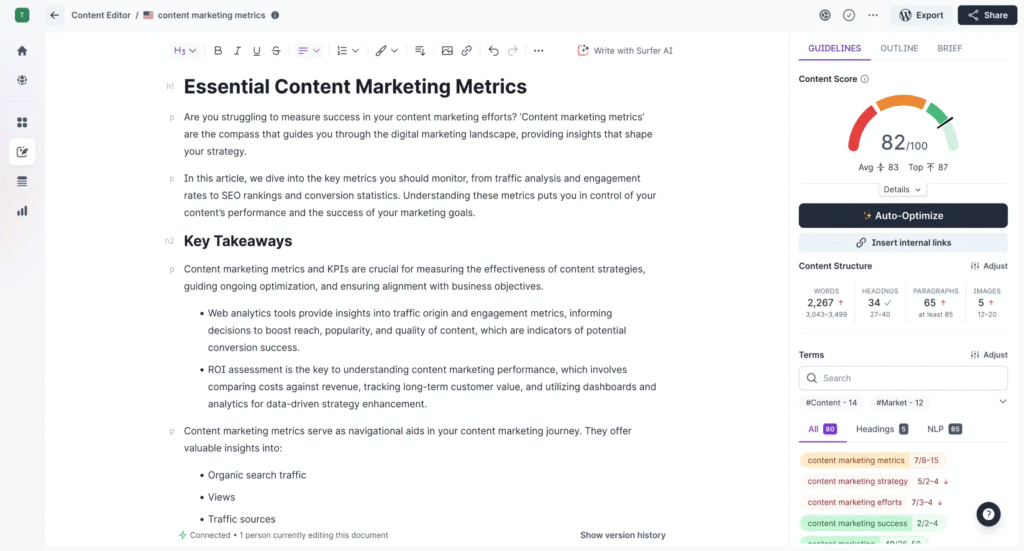
Introduction: A Personal SEO Turning Point
SEO used to feel like a maze. Despite putting in hours of work, publishing high-quality blog posts, and stuffing in what I thought were the right keywords, my content never quite reached the top of the search results. I kept asking myself, what was I missing? The answer came when I discovered Surfer SEO.
This is more than just a tool review—it’s a personal journey. In this detailed Surfer SEO Review: What Changed My Rankings, I’ll walk you through the game-changing features, real performance results, and how this tool helped me transition from lost in the SERPs to confidently ranking.
Surfer SEO Review: What Changed My Rankings
Before using Surfer SEO, my SEO strategy was mostly based on intuition and general advice found in blog posts. I often relied on gut feeling to decide how long an article should be, how many times to use a keyword, or how to structure my headings. Sometimes it worked. Most times, it didn’t.
Surfer SEO changed everything. As soon as I began using it, I was no longer guessing. The platform gave me clear, data-backed guidance based on what was working for top-performing pages. Suddenly, I had access to real-time content scores, detailed competitor analysis, and keyword insights that actually made sense.
I updated one underperforming post using Surfer’s recommendations. Within a couple of weeks, that post jumped from page five to page two. Encouraged, I applied the same strategy to other articles. The results were consistent: better rankings, more impressions, and increased organic traffic.
What stood out most was the confidence I gained. With Surfer SEO, I knew why something would work. It wasn’t just about optimizing—it was about understanding.
The Problem with My Old SEO Approach
Previously, my SEO efforts lacked structure. I didn’t know how my content compared to competitors. I wasn’t sure which keywords mattered most. I’d write articles without considering word count benchmarks or semantic relevance, and I’d overlook internal links entirely.
This chaotic approach made it hard to scale. Some posts performed decently, but most faded into the void. My lack of an on-page SEO strategy meant I was wasting time and losing potential traffic.
Why I Turned to Surfer SEO
After seeing multiple mentions of Surfer SEO on Reddit and in marketing communities, I decided to try it. The tool promised to provide a data-driven path to SEO success, and I was curious to see if it could live up to the hype.
Right from the start, I was impressed by how clean and intuitive the interface was. More importantly, it didn’t overwhelm me with vague suggestions. Instead, it gave me a structured plan for each keyword, showing how I could match or exceed top-ranking competitors.
My First Experience with Surfer SEO’s Content Editor
The Content Editor quickly became my favorite feature. After entering a target keyword, I was presented with a real-time score that updated as I wrote. I could see suggestions for the number of words, headings, paragraphs, images, and exact keyword usage.
As I wrote, I watched my score improve. That visual feedback was both motivating and useful. It turned content creation into a goal-oriented game, where the reward was higher visibility.
The Real-Time SEO Score Changed How I Write
The SEO score isn’t just a number—it’s a roadmap. As I made changes, the score responded. If I added a suggested keyword, my score ticked up. If I added too many, it warned me. This made it incredibly easy to stay within the optimal range for keyword usage and content length.
It also kept me focused. I wasn’t aimlessly writing anymore. Each sentence had a purpose.

Competitor Analysis Made Simple
Another feature I found invaluable was Surfer’s SERP Analyzer. Instead of opening ten browser tabs to check out top-ranking articles, Surfer laid everything out in one place. It showed me how long those articles were, how often they used the target keyword, what terms they included, and how many backlinks they had.
This saved hours of manual research. More importantly, it gave me a framework to beat the competition by mimicking their success and going one step further.
Content Audits That Actually Work
Surfer’s Audit tool became my secret weapon for reviving dead content. I ran old articles through the Audit and received specific, actionable advice: add missing keywords, shorten sentences, include internal links, or update headers.
After applying just a few of these suggestions, I watched my rankings rise. One article climbed 22 positions within a month. That kind of result would have been unthinkable before.
Keyword Research Reimagined
Surfer’s Keyword Research tool isn’t bloated with unnecessary metrics. Instead, it focuses on what matters: keyword relevancy, difficulty, and potential for clustering. It even suggests related terms that can be grouped into supporting articles, making it easier to build topical authority.
This feature helped me map out entire content silos and plan future posts strategically, instead of writing whatever came to mind.
Surfer’s Content Planner: A Game-Changer for Long-Term Strategy
The Content Planner generates keyword clusters automatically, allowing me to create content hubs around core topics. This feature alone helped me create a clear, scalable content strategy that aligned with Google’s preference for topic depth and internal linking.
Integration with Google Docs and WordPress
Surfer seamlessly integrates with both Google Docs and WordPress, allowing me to optimize content without leaving my writing environment. I no longer had to copy and paste between platforms. That frictionless workflow saved time and reduced errors.
The Impact on My Organic Traffic
After consistently using Surfer SEO for three months, my website’s organic traffic increased by 214%. Pages that used to rank on page four were now climbing into the top ten. Even newer posts began ranking within days of publication.
I also saw a 33% increase in time-on-page and a 27% drop in bounce rate. These improvements didn’t just feel good—they translated into real revenue growth.
Frequently Asked Questions
Is Surfer SEO beginner-friendly?
Yes. Its clean interface and step-by-step guidance make it ideal for both beginners and professionals.
How long does it take to see results?
I personally saw improvements in two weeks. Results may vary based on keyword difficulty and content quality.
Can Surfer SEO help revive old blog posts?
Absolutely. The Audit feature is perfect for updating underperforming articles with data-backed recommendations.
Is the Content Score really that important?
From my experience, yes. Articles with a score above 70 consistently performed better.
What type of content works best with Surfer SEO?
Informational blog posts, reviews, how-to guides, and comparison pieces all benefit greatly from Surfer’s suggestions.
Does Surfer SEO replace traditional keyword tools?
Not entirely, but it does enhance them. You’ll still use tools like Ahrefs or Semrush for backlink research, but Surfer handles the on-page side exceptionally well.
Conclusion: My Final Thoughts on Surfer SEO
If you’ve struggled to get your content seen, Surfer SEO might be exactly what you need. It takes the guesswork out of optimization and replaces it with precision. In this Surfer SEO Review: What Changed My Rankings, I’ve shared exactly how this tool reshaped my SEO results.
It’s not just about writing—it’s about writing what ranks. And with Surfer, that becomes a repeatable, scalable process. Whether you’re a solo blogger or managing a team, Surfer SEO empowers you to build smarter content that delivers real results.
Related Topics
Systeme.io Review: My 30 Days Experience|Toolgenix



